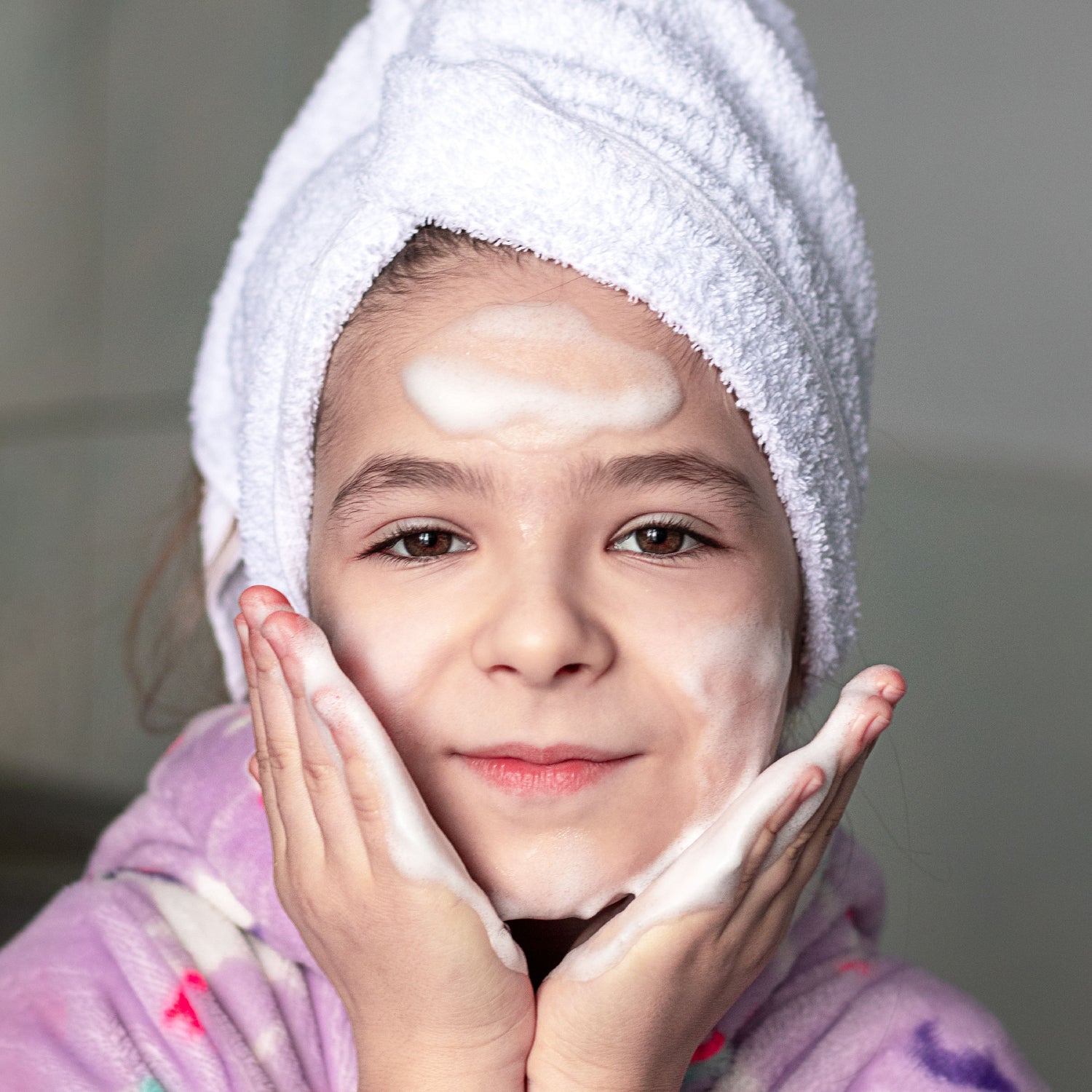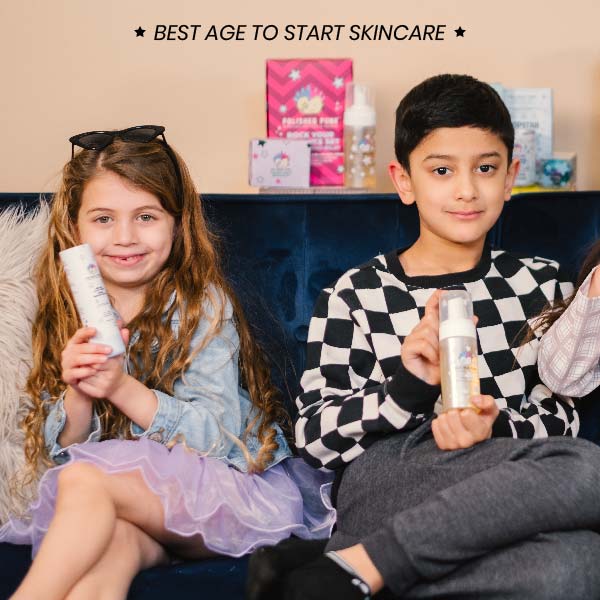Understanding your kids’ skin type is crucial for crafting an effective skincare routine that goes beyond appearance to promote overall well-being. Just as adults have diverse skin types, kids and tweens exhibit a range of variations, each requiring tailored care. Skin serves as a vital protective barrier, regulating temperature and fending off pathogens. By comprehending these complexities, parents can nurture their kid’s skin and instill lifelong self-care habits. Exploring various skin types in kids and tweens reveals the importance of attentive skin care for different skin types.
Types of Skin in Kids and Tweens
Every kid has a unique skin type, like their personalities and traits. Kids need to understand and embrace this diversity, recognizing that there's no one-size-fits-all approach to skincare. Just as we celebrate their distinct talents and interests, embracing skin type fosters self-confidence and self-acceptance. Teaching kids to appreciate and care for their skin not only promotes physical health but also instills valuable lessons in self-care and acceptance. Let's delve into detailed explanations of each skin type for kids:
Normal Skin
Normal skin is often considered the gold standard of skin types. It's well-balanced, meaning it's neither too oily nor too dry. Kids with normal skin typically have small pores, a smooth texture, and an even complexion. They're less prone to breakouts or sensitivity, enjoying minimal issues with dryness or excess oiliness. Normal skin requires basic maintenance like regular cleansing and moisturizing to keep it healthy and radiant. Polished Punk’s Sublime Face Cream is suitable for use on all skin types. While it's essential for kids with normal skin to maintain a skincare routine, they can also enjoy the freedom of experimenting with different products without significant concerns.
Dry Skin Type
Dry skin in kids lacks sufficient moisture, leading to symptoms such as roughness, flakiness, and occasional itching or tightness. Kids with dry skin may experience discomfort, especially in colder climates or dry environments. Dry skin can result from genetic factors, environmental influences, or improper skincare habits. To care for dry skin, it's crucial to use hydrating and nourishing skincare products that replenish moisture and strengthen the skin barrier. Additionally, maintaining adequate hydration by drinking plenty of water and using humidifiers in dry indoor spaces can help alleviate dryness and promote skin health.
Oily Skin Type
Oily skin in kids is characterized by excessive sebum production, resulting in a shiny complexion, enlarged pores, and a predisposition to acne and blackheads. Hormonal changes during puberty often exacerbate oil production, leading to increased sebum secretion. While oily skin helps keep the skin naturally moisturized, excessive oiliness can lead to clogged pores and breakouts. Kids with oily skin should use gentle, non-comedogenic cleansers and oil-free moisturizers to maintain skin hygiene without stripping away essential moisture. Polished Punk’s Whipped Foaming Facial Cleanser wipes away oil from the skin, without destroying the skin’s natural barrier. Additionally, incorporating products containing ingredients like salicylic acid or benzoyl peroxide can help manage acne flare-ups.
Acne Prone Skin Type
Acne-prone skin is characterized by frequent breakouts, inflammation, and the presence of pimples, whiteheads, or blackheads. This skin type is often associated with oily skin due to increased sebum production, but it can also occur in individuals with other skin types. Acne can have various causes, including hormonal changes, genetics, and environmental factors. Kids with acne-prone skin should adopt a consistent skincare routine that includes gentle cleansing, exfoliation, and acne-fighting ingredients such as benzoyl peroxide or salicylic acid. Consulting a dermatologist for personalized treatment options is essential for managing acne effectively.

Combination Skin Type
Combination skin presents a unique challenge as it features both oily and dry areas on the face. Kids with combination skin often have an oily T-zone (forehead, nose, and chin) while experiencing dryness on the cheeks or other parts of the face. Balancing hydration without exacerbating oiliness or dryness is key for managing combination skin. Using lightweight, oil-free moisturizers and targeted treatments for specific areas of concern can help maintain a harmonious balance. Additionally, practicing proper skincare habits such as gentle cleansing and regular exfoliation can prevent clogged pores and breakouts in oily areas while providing adequate hydration to dry areas.
Sensitive Skin Type
Sensitive skin is easily irritated and prone to reactions such as redness, itching, or stinging in response to certain products or environmental triggers. Kids with sensitive skin may experience discomfort or allergic reactions when exposed to harsh chemicals, fragrances, or abrasive ingredients. Caring for sensitive skin involves using gentle, hypoallergenic skincare products formulated specifically for sensitive skin types. Avoiding potential irritants and allergens, such as harsh soaps or synthetic fragrances, can help prevent adverse reactions. Additionally, maintaining a consistent skincare routine and patch testing new products before full application can minimize the risk of sensitivity flare-ups.
How to Identify Your Kids’ Skin Type?
Identifying your kids’ skin type is crucial for establishing an effective skincare routine. Observation of skin texture, oiliness, dryness, and sensitivity, along with their skin's reaction to different products, can provide valuable insights. Consulting a dermatologist for professional guidance or using skin type tests as supplementary tools can further aid in determining their skin type. By combining these methods, parents can tailor skincare regimens to meet their kids’ specific needs, ensuring optimal skin health and well-being.
How to Choose the Best Skincare Product According to Your Kid's Skin Type?
Choosing the best skincare products for your kids’ skin type involves several considerations. Firstly, understanding your kids’ skin type through observation and consultation with a dermatologist is crucial. For dry skin, opt for hydrating and nourishing products, while oil-free and non-comedogenic formulations are suitable for oily skin. Sensitive skin requires gentle, fragrance-free products to prevent irritation. Combination skin benefits from balanced formulations targeting specific areas. Reading product labels carefully and avoiding harsh chemicals or allergens is essential for all skin types. Additionally, patch-testing new products before full application helps prevent adverse reactions. By selecting products tailored to your kid’s skin type and preferences, you can effectively care for their skin and promote overall health and well-being. Polished Punk offers gentle products made from organic ingredients, suitable for all skin types.

Frequently Asked Questions - FAQs
What is the most rare skin type?
According to Quora, the most rare skin type is often considered to be sensitive skin. Sensitive skin is characterized by heightened reactivity and intolerance to certain ingredients or environmental factors. Individuals with sensitive skin may experience redness, itching, or allergic reactions more easily compared to other skin types.
Are skin types genetic?
Yes, skin types can be influenced by genetics. Traits such as oil production, hydration levels, and sensitivity can be inherited from parents. While genetics play a significant role in determining skin type, environmental factors, lifestyle choices, and skincare habits also contribute to skin health and appearance.
What is the healthiest skin type?
Typically, the healthiest skin type is considered to be normal skin. Normal skin is well-balanced, with optimal hydration levels, small pores, and a smooth texture. It maintains a natural equilibrium of pH levels and sebum production, minimizing the risk of common skin issues such as dryness, oiliness, or sensitivity. However, with the correct skin care regimen and products, all skin types can be healthy.





